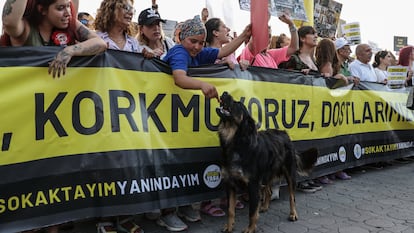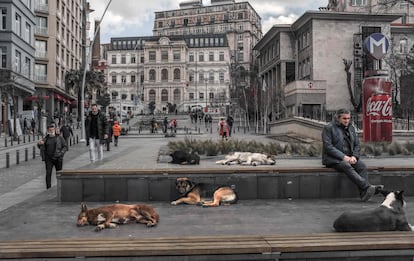Turkey divided on new law cracking down on stray dogs
Islamists argue that the four million stray dogs have become a security problem, while animal rights activists claim that the new legislation paves the way for the slaughter of these animals, which have always been part of Turkish cities


A legislative reform approved last week by the Turkish parliament aims to put an end to the four million stray dogs in the country. The law has caused great controversy and divided Turkish society. Islamists in President Recep Tayyip Erdoğan’s Justice and Development Party (AK) argue that the measure is needed to guarantee safety on the streets and animal welfare; while the opposition and animal rights associations believe that it authorizes the “massacre” of dogs.
Dogs, and cats too, are an inseparable part of the Turkish landscape, like the minarets of mosques or the merchants selling their wares. The cats roam freely, entering and leaving cafés, stretching out inside a shop; the dogs often stroll through the parks and streets or lie down to take a nap in the middle of the sidewalk. Locals pet them and give them food. In exchange, they keep the cities free of rats (Paris, take note), which is a challenge in cities like Istanbul, with its more than 16 million inhabitants, several million more tourists and a huge production of waste.
It has always been this way, even though in some Muslim societies, dogs are seen as impure. In Turkey, dogs haev protected neighborhoods and kept the streets clean, becoming a part of the city. This was even observed by 19th-century writers who visited Istanbul. “The Turks themselves live in peace with all the animate and inanimate creation [...] In all the streets there are, at certain distances, vessels filled with water for the dogs,” wrote French writer Alphonse de Lamartine in 1833. And Mark Twain, three decades later, reflected on the tranquility of the dogs in the Turkish capital: “They would not move, through the Sultan himself passed by.”
But, as with everything, not all dogs live equally. There is a difference between the dogs in the wealthiest neighborhoods and those who survive in the outskirts, between roundabouts, motorways and workshops. On the outskirts of cities, packs form and sometimes attack pedestrians, cyclists and even cars. “Last year alone, dogs attacked 400 children,” Abdullah Güler, head of the parliamentary group of the ruling AK, told this newspaper: “In the last four years, there have been 5,000 traffic accidents caused by dogs and 55 people have died. The number of contacts susceptible to rabies has skyrocketed. All indicators show that there is a problem.”
🚨 KÖPEK SALDIRISI
— Sokakta Köpek Olmaz (@Skktkpklmz) July 22, 2024
Niğde'de başıboş iki köpeğin saldırısına uğrayan 54 yaşındaki kadın;
"İşten çıkıp evime gitmek üzereyken 2 köpek saldırdı. Kaçacak yer bulamadım, biri dudağımdan tuttu, biri kolumdan yerde sürüklediler. Yardım edin diye bağırdım" dedi. pic.twitter.com/j9Ow6xJ8Tu
The legislative reform was approved last week after several sessions of tense debate. The new text forces local councils to collect all stray dogs from the streets and house them in kennels until they are adopted. Dogs with incurable diseases and those that pose a risk to other animals or people will be euthanized. Thanks to the amendments, cats have been excluded, and the text has been moderated: all unclaimed animals were originally to be euthanized within 30 days. Nevertheless, the opposition has announced it will appeal to the Constitutional Court, and the center-left CHP party has said that local councils controlled by its group will not apply the law regarding the euthanization of dogs.
The new legislation represents a shift from the animal rights policies that have been in force in Turkey until now. In 2004, the AK itself passed a law that prohibited the slaughter of stray animals and instituted the current model. Under this rule, municipalities have to collect stray animals, vaccinate, neuter and microchip them, and then release them in the same spot where they were found. What’s more, four years ago, the Turkish Parliament increased animal rights and penalties for animal abuse by consensus. In the midst of the Covid-19 lockdown, even the Minister of the Interior ordered that food and water be brought to parks and squares so that stray dogs could eat.
What has changed? According to Güler, the Islamist politician, the blame lies with his CHP rivals, who, since they won the metropolitan mayoralties of Istanbul and Ankara in 2019, have left stray animals “unattended,” which has led “the dog population to increase rapidly.”
The reasons driving the new law have a lost to do with political rivalry. On the one hand, it has been a clever way for the Islamist right to once again stir up the cultural wars, accusing the left of being more concerned with animal rights than human rights, while diverting the spotlight from criticism of its economic austerity policies.
Erdoğan is not one to do anything without a plan. And the municipal elections of last March — his first electoral defeat in more than two decades — still sting. In that vote, a new Islamist party, CHP, came to the fore that campaigned against the LGBTQ+ community and stray dogs. With AP under threat from the right, the new law is aimed at pleasing that more conservative sector of its electorate. With this new law, Erdoğan puts the CHP — which has controlled the main cities of the country since March — in a difficult position by entrusting them with implementing the rule, which must be done within four years. What’s more, mayors and municipal officials who are not able to enforce it could face prison sentences of between six months and two years.
But it is a Herculean task: there are currently 322 kennels across Turkey, with a capacity for 105,000 dogs, so more than 10,000 shelters would have to be built to accommodate the 4 million stray dogs. Under the new law, municipalities must allocate between 0.3 and 0.5% of their budget to shelters for stray animals. But, according to an estimate by the animal welfare federation HAYTAP, Istanbul Metropolitan Municipality would have to spend at least 14% of its budget to accommodate the estimated half-million dog colony living within the city limits.
Volunteers in the forests
Many of stray dogs live in the forests in the north of the city. Businessman Iskender Çayla goes there twice a week with his employee Metin Aydin, loaded with food and water. “The problem is that for the past 20 years, Istanbul’s municipalities, which were in the hands of Erdoğan’s party, collected dogs from the streets and released them into forests and roads, sometimes without even neutering them. There are also people who abandon their pets here,” Çayla complains. “That’s why I started coming here in 2018 when I saw some abandoned and hungry puppies.”
As soon as they hear Çayla’s whistle, the dogs appear from the undergrowth and run towards his vehicle which is carrying 250 kilos of food: some bones and meat that he buys out of his own pocket, some leftovers from breakfasts (sausages, beans, meat pies, eggs...) that he gets from hotels whose owners he knows. In just three hours, the food will be gone and more than a hundred dogs will be sleeping with full stomachs. “If we volunteers didn’t come, these dogs would be left without food and without water,” he explains. Even if the dogs become wild in this landscape of forests, motorways, quarries, small villages and new housing estates under construction in northern Istanbul, they are still domestic animals, they are not used to hunting or looking for food.
The dogs are sometimes attacked by wild boars that inhabit these forests and compete with them for the scarce organic waste, so they form packs to defend themselves, which further frightens the inhabitants of these areas.

“The girls are afraid when they go to school early in the morning because the dogs chase them,” explains Mehmet, a worker waiting for the bus at the end of a construction site, who watches with a mix of surprise and suspicion as volunteers look after a group of dogs. Mehmet thinks that stray dogs should be confined in kennels, although he opposes their slaughter: “The life that God has given, only God can take away.”
Çayla recalls that in 1910, the Ottoman authorities, in an effort to “Europeanize” the country, tried to clean up the streets of Istanbul by rounding up 80,000 stray dogs on an island in the Sea of Marmara. Without food or water, the unfortunate animals soon turned on each other and ate one other, until they slowly died. It is said that from across the city, residents could hear the howling of the dying dogs in horror. “Everyone in Istanbul knows this story and is ashamed of it,” says Çayla: “Now, whoever kills them will once again go down in history as a disgrace.”
Sign up for our weekly newsletter to get more English-language news coverage from EL PAÍS USA Edition
Tu suscripción se está usando en otro dispositivo
¿Quieres añadir otro usuario a tu suscripción?
Si continúas leyendo en este dispositivo, no se podrá leer en el otro.
FlechaTu suscripción se está usando en otro dispositivo y solo puedes acceder a EL PAÍS desde un dispositivo a la vez.
Si quieres compartir tu cuenta, cambia tu suscripción a la modalidad Premium, así podrás añadir otro usuario. Cada uno accederá con su propia cuenta de email, lo que os permitirá personalizar vuestra experiencia en EL PAÍS.
¿Tienes una suscripción de empresa? Accede aquí para contratar más cuentas.
En el caso de no saber quién está usando tu cuenta, te recomendamos cambiar tu contraseña aquí.
Si decides continuar compartiendo tu cuenta, este mensaje se mostrará en tu dispositivo y en el de la otra persona que está usando tu cuenta de forma indefinida, afectando a tu experiencia de lectura. Puedes consultar aquí los términos y condiciones de la suscripción digital.








































